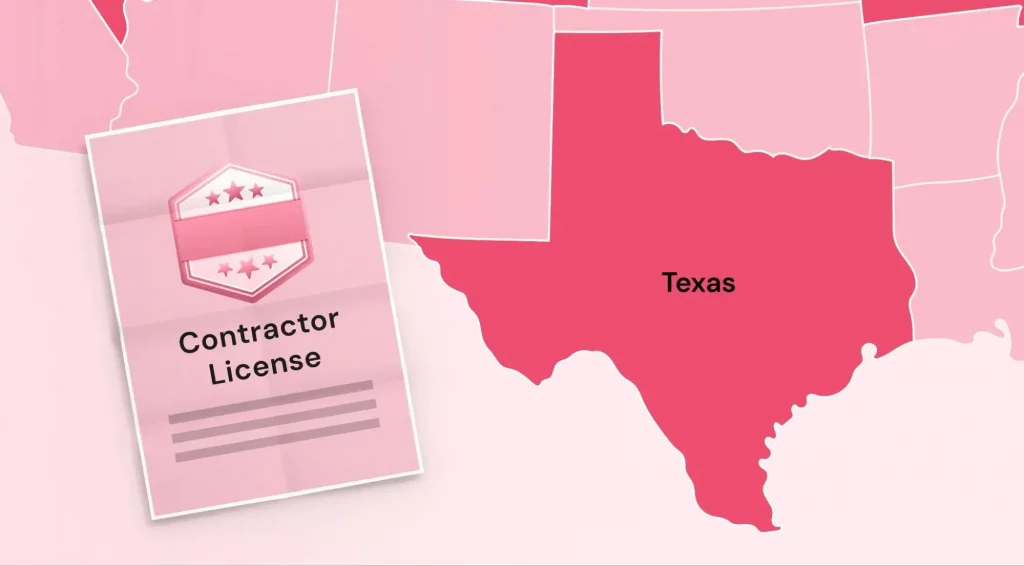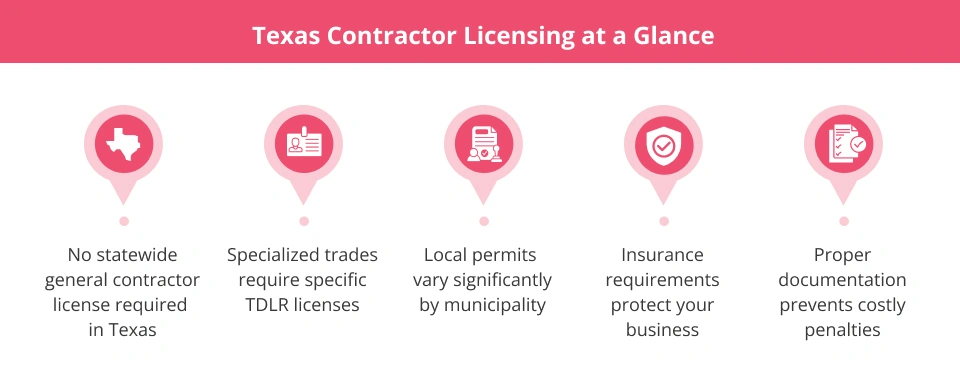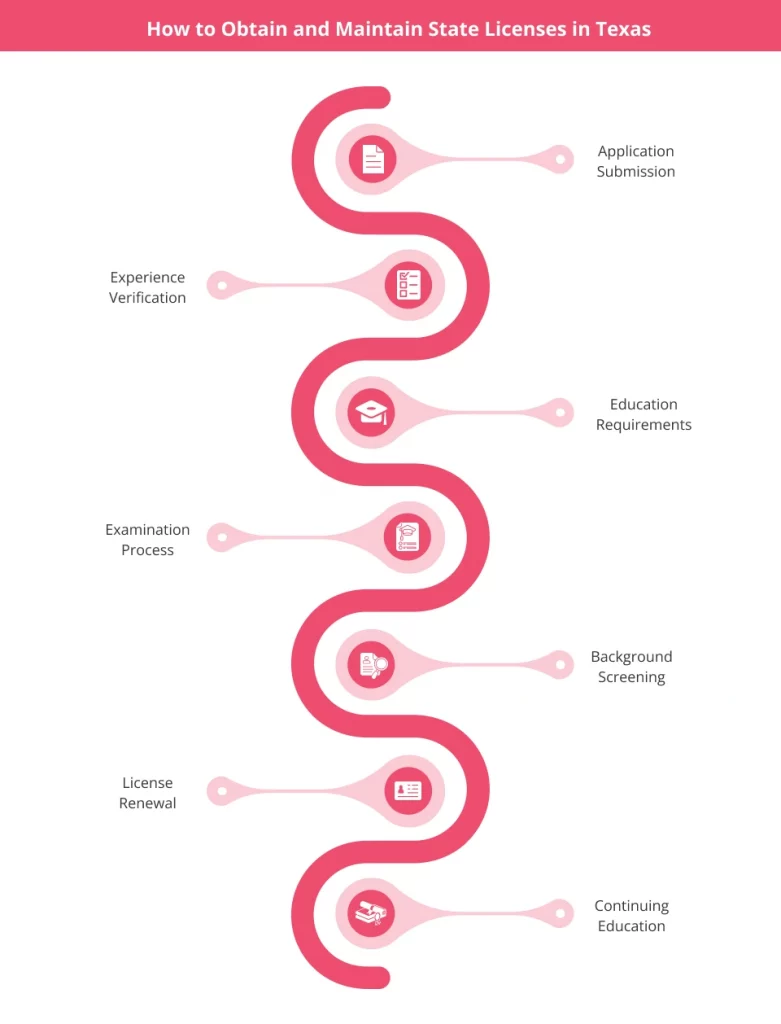The process for Texas contractor licensing can feel like riding a bucking bronco, unpredictable and with no single path to follow. Unlike most states with simple statewide licensing, Texas throws contractors a curveball with its mix of local requirements and trade-specific regulations.
One moment you are submitting registration paperwork to Houston’s permitting office, the next you are trying to understand Dallas’s entirely different contractor approval system, and then you are studying Austin’s eco-friendly building codes that change the game altogether.
This regulatory patchwork catches many contractors off guard, especially those used to more unified systems in other states. Understanding how to get a contractor license in Texas is essential for protecting your business, accessing premium projects, and thriving in one of America’s most robust construction markets. This article can come in handy as you prepare for your contractor’s license in Texas. Read on.
Understanding Texas Contractor License Requirements
As a contractor working in Texas, you need to be aware that the regulatory environment here differs significantly from most other states. Texas does not require a statewide general contractor license. This often confuses the professionals who plan to relocate from other regions where such licensing is standard.
Instead, licensing type and registration requirements depend heavily on location and type of work. While general contractors may not need a license from the state, many cities enforce their own rules. For example:
- Houston requires contractor registration as part of its building permitting process through the Houston Permitting Center.
- Dallas follows a separate contractor approval process, with unique forms and standards.
- Austin mandates additional steps for certain types of construction work within city limits.
- San Antonio has different documentation requirements depending on the type of license or scope of work.
- El Paso may ask for specific certifications even if state licensing isn’t necessary.
In addition to local laws, the Texas Department of Licensing and Regulation (TDLR) oversees several specialized trades that require state licenses. These include air conditioning and refrigeration contractors, electricians, HVAC technicians, plumbers, and several others. Each of these trades has its own set of education, job training, work experience, and exam requirements that must be met before beginning work legally.
Even if licensing is not mandatory in your trade or area, voluntary credentials can strengthen your general contracting business in the following ways:
- Improved insurance options and lower premiums due to verified skills and compliance
- Increased trust from clients who associate licensing with professionalism
- A legal advantage in resolving disputes related to the scope of work or project responsibility
- Greater eligibility for government or commercial projects that require credentialed contractors
Understanding Texas contractor license requirements across both the state and your local licensing authority helps you stay compliant, reduce risk, and strengthen your market position. Following proper procedures demonstrates your commitment to quality and opens doors to larger projects with institutional clients who require credentialed contractors.
How to Get a Contractor License in Texas: State-Level Licensing Requirements
You should have the necessary credentials from the TDLR before performing regulated work in the following trades:
- Air Conditioning and Refrigeration Contractors: You need either a Class A license for unlimited system tonnage or a Class B license for systems under 25 tons. Requirements include four years of experience and passing both a technical exam and a business law exam.
- Electrical Contractors and Electricians: The state requires licensing at various levels from apprentice to master electrician. You have to document appropriate experience hours, complete technical education, and pass Texas state licensing examinations for electrical contractors and electricians that test both practical knowledge and safety protocols.
- Plumbing Contractors and Plumbers: The Texas State Board of Plumbing Examiners regulates all plumbing work. You progress through multiple license levels, starting as a tradesman, advancing to journeyman, and ultimately reaching the master plumber level.
- Architectural Barriers Specialists: You have to complete the registration with TDLR to perform accessibility inspections or reviews. Requirements include specific education in architecture, engineering, or related fields plus training in Texas Accessibility Standards and Americans with Disabilities Act guidelines.
- Fire Sprinkler Installation Contractors: The State Fire Marshal’s Office requires licensing for anyone who plans, sells, installs, or services fire protection sprinkler systems. You need documented experience, professional references, and must pass technical examinations.
- Well Drillers and Pump Installers: TDLR requires specific licenses for drilling water wells and installing pumps. You need ought to complete apprenticeship requirements, document field experience, and pass technical examinations covering groundwater regulations.
- Solar Installation Contractors: New regulatory updates for solar contractors in Texas, under the Residential Solar Retailer Regulatory Act, are primarily taking effect on June 1, 2026. This legislation introduces requirements for registration and licensing for solar salespersons and retailers, along with penalties for non-compliance.
|
How Long Does It Take to Get a Contractor License in Texas?
The timeline for obtaining a contractor’s license in Texas varies depending on the specific trade and your level of preparation. For most specialized trades regulated by TDLR, you can expect:
- Application Processing: 2-4 weeks after submission of a complete application
- Examination Scheduling: 1-3 weeks to schedule your Texas contractor license exam date.
- Results and License Issuance: 1-2 weeks after passing the required exams
Total time from application to license issuance typically ranges from 4-8 weeks for most specialized contractors. However, this timeline assumes you have already fulfilled all experience and education prerequisites, which can take several years depending on the license type.
How Much Does the Texas General Contractor License Cost?
Understanding the financial investment is crucial for planning on how to get a contractor license in Texas. Costs vary significantly based on license type and location:
| License Type | Application/Registration Fee | Examination Fee | Renewal Fee |
| Air Conditioning & Refrigeration | |||
| Class A | $115 | Included in application | $115 (annual) |
| Class B | $115 | Included in application | $115 (annual) |
| Plumbing | |||
| Responsible Master Plumber | $225 | N/A | $225 (annual) |
| Master Plumber | $75 | $128.50 | $75 (annual) |
| Journeyman Plumber | N/A | $40 | N/A |
| Tradesman Plumber Limited | $35 | $36 | $35 (annual) |
| Plumbing Inspector | $55 | $55 | $55 (annual) |
| Electrical | |||
| Master Electrician | $45 | $74 | $45 (annual) |
| Journeyman Electrician | $30 | $74 | $30 (annual) |
| Apprentice Electrician | N/A | $78 | N/A |
| City Registration | |||
| Dallas | $120 (initial) | N/A | Varies |
| San Antonio | $170 (for 2 years) | N/A | $170 (biennial) |
| Houston | Varies by trade | N/A | Varies |
When starting a contracting business in Texas, most contractors should budget between $2,000 and $7,000 for initial licensing, registration, insurance, and bonding costs. Subsequently, Texas contractor license renewal and maintenance costs typically range from $1,000 to $3,000 annually, depending on your specific trade and the jurisdictions in which you operate.
How to Obtain a Texas Contractor License?
Follow these steps to understand how to get a contractor license in Texas:
 Step 1: Application Submission
Step 1: Application Submission
Create an account on the Texas Department of Licensing and Regulation (TDLR) website or the Texas State Board of Plumbing Examiners (TSBPE) portal and complete the online application specific to your trade. Personal information, business entity details, and documentation of qualifying experience before submitting the required fees.
Step 2: Experience Verification
Document your hands-on experience in the field through employment records, project descriptions, and supervisor affidavits. Most specialties require 3-4 years of verifiable experience with progressively increasing responsibility levels in your specific trade.
Step 3: Education Requirements
Complete approved training courses relevant to your specialty. Many trades require specific classroom hours covering technical knowledge, safety protocols, and applicable building codes before you qualify for examination.
Step 4: Examination Process
Schedule and pass both the trade-specific technical exam and the business law exam. The technical portion tests practical knowledge while the business section covers contracts, liability, and regulatory compliance.
Step 5: Background Screening
Submit to criminal history checks that examine your record for relevant offenses. Certain convictions may disqualify you from obtaining a Texas general contractor license depending on the nature and timing of the offense.
Step 6: License Renewal
Mark Texas contractor license renewal deadlines on your calendar and submit documentation before expiration. Most Texas contractor licenses require renewal every 1-2 years, along with proof of continuing education credits covering code updates and safety. You need to log in to the respective TDLR or TSBPE website for renewal, as applicable.
Step 7: Continuing Education
Complete the required continuing education hours during each licensing period. These courses keep you updated on code changes, new technologies, and safety requirements applicable to your specialty.
Navigating Local Contractor Regulations in Major Texas Cities
Understanding the following city-specific Texas contractor licensing rules is crucial before you start bidding on projects or performing work to avoid potential penalties.
Houston Contractor Requirements
Houston enforces the following regulations through its permitting system for construction projects within city limits:
- Register with the city Building Code Enforcement Department before applying for permits.
- Provide proof of general liability insurance with minimum coverage of $300,000.
- Submit references from previous commercial or residential construction projects.
- Renew your registration annually and update your insurance certificates when they expire.
Working in Houston requires familiarity with the plan review process and inspection scheduling procedures specific to this municipality.
Dallas Contractor License Registration Process
Dallas maintains its own contractor registration system separate from state and other municipal requirements. Here are its key aspects:
- Complete the Dallas contractor registration application available online on the Dallas City Hall website.
- Show proof of liability insurance meeting city-specific coverage requirements.
- Pay registration fees that vary based on your contractor classification.
- Submit to background checks that examine your construction history and compliance record.
Understanding Dallas-specific building codes and inspection protocols will help you navigate projects more efficiently within city limits.
San Antonio Contractor License Requirements
San Antonio requires contractors to register through its Development Services Department before obtaining permits. The process involves the following steps.
- Submit your application through the BuildSA portal with proper documentation.
- Provide proof of appropriate insurance coverage meeting city minimums.
- Demonstrate compliance with applicable state licensing for specialized trades.
- Renew your registration annually with updated insurance and contact information.
The city’s unified development code contains San Antonio-specific requirements you must follow for all construction projects.
Austin Contractor License Requirements and Green Building Standards
City of Austin implements progressive building standards focusing on sustainability and energy efficiency. Your projects need to satisfy these requirements.
- Register with the city’s Development Services Department as a contractor.
- Demonstrate knowledge of the Austin Energy Green Building program requirements.
- Prepare for additional inspections related to energy efficiency and water conservation.
- Submit documentation with the local authorities for special reviews depending on project location and scope.
Austin’s emphasis on sustainable construction practices requires additional planning and documentation compared to other Texas municipalities.
“Understanding Austin’s unique green building requirements opened doors to high-end residential projects. My TDLR license credentials give clients peace of mind and have reduced liability concerns that used to keep me awake at night.”
Jake Brown, Sustainable Homes Texas, Austin
What are the General Texas Contractor Licensing Insurance Requirements?
Here are the key aspects of different types of insurance coverage required under Texas contractor licensing:
- General Liability Insurance: This fundamental coverage protects your business from third-party claims for property damage or bodily injury.
- Workers’ Compensation Insurance: This protection helps with employee injury claims and provides medical benefits for workers injured on the job, protecting both your team and financial stability.
- Professional Liability Insurance: This protection is valuable for design-build projects or when providing consulting services beyond standard construction, as general liability policies typically exclude professional mistakes.
- Property and Equipment Coverage: Consider inventorying all business property, maintaining updated replacement values, and looking into inland marine coverage for items that move between job sites rather than standard fixed-location policies.
Texas Contractor License: Understanding Permits, Inspection & Compliance
Your projects benefit from proper permitting and passing multiple inspections to maintain compliance with applicable codes.
Understanding Permit Types
Identifying which permits apply to your specific project scope before beginning work saves time and prevents complications. Different projects require different approvals.
- Look into building permits for new construction and major renovations.
- Consider specialized permits for electrical, plumbing, and mechanical work.
- Research demolition permits before removing existing structures.
- Check on zoning permits or variances when changing property use.
Inspection Processes
Scheduling and passing multiple inspections during different construction phases verifies compliance with approved plans and building codes.
- Plan for foundation inspections before pouring concrete.
- Prepare for framing inspections after rough-in work but before enclosing walls.
- Schedule mechanical, electrical, and plumbing inspections before covering work.
- Get ready for final inspections after project completion but before occupancy.
Avoiding Common Compliance Issues
Preventing code violations through proactive planning and education supports project timelines and budget control.
- Stay current on code versions adopted by your jurisdiction.
- Document any approved modifications to standard requirements.
- Take photos of critical installations before covering work.
- Keep communication open with inspectors throughout the project.
Working With Building Officials
Establishing professional relationships with local building officials facilitates smoother project approvals.
- Consider scheduling pre-application meetings for complex projects.
- Ask questions about interpretations before submitting plans.
- Keep communication respectful even during disagreements.
- Document conversations and decisions for future reference.
Texas Contractor License: What are the Penalties for Non-Compliance?
Failing to follow Texas contractor regulations can lead to significant problems for your business and personal finances.
- Financial Penalties: Working without required licenses in regulated trades can trigger fines ranging from $500 to $5,000 per violation, with each day potentially counting as a separate offense. Local jurisdictions often impose additional penalties through their enforcement divisions.
- Legal Vulnerability: Operating without proper credentials creates significant legal exposure through potential lawsuits from dissatisfied clients. Texas courts typically view unlicensed contractors unfavorably in disputes, limiting your ability to collect payment for completed work.
- Insurance Implications: Your insurance carrier might deny claims arising from projects performed without required licensing or permits, leaving you personally exposed to financial liability. Working outside your license classification or performing unauthorized work often triggers exclusions in liability policies.
- Reputation Damage: Online review platforms and contractor verification services make regulatory violations increasingly visible to potential clients. The Texas Secretary of State maintains publicly searchable records of business compliance issues. The local permitting offices also publish violation information that are available long after penalties are paid.
Final Thoughts
Understanding the process of how to get a contractor license in Texas can be complex, with its blend of state-level mandates for specialty trades and city-specific rules for general contractors. Staying compliant is essential for protecting your business and qualifying for more significant projects. We recommend you bookmark this guide for future reference. However, since regulations and fees can change, always verify the most current information directly with the Texas Department of Licensing and Regulation (TDLR), the Texas State Board of Plumbing Examiners (TSBPE), and the local city governments where you intend to work.
Once your licensing is secure, excelling at project delivery becomes the priority. If you need to streamline your project visualization, improve client communication, and accelerate the design process, consider exploring Foyr Neo. We help thousands of construction professionals transform their initial concepts into detailed 3D floor plans and photorealistic renderings. This clarity helps clients fully understand the project scope, reducing misunderstandings and ensuring your vision is perfectly executed.
Sign up for a 14-day free trial and discover how our intuitive platform can help your contractor work in Texas. Florida.
Disclaimer: This guide is informational. Regulations change—always confirm with TDLR or your local building office.
FAQs on Texas Contractor License
Does Texas have reciprocity for contractors’ license?
Texas contractor license reciprocity is available for specific trades like electricians (with certain states like Arkansas, New Mexico, Oklahoma for Journeyman/Master) and plumbers (with Louisiana and Arkansas). General contractor licenses are city-specific, and statewide reciprocity isn’t available for them. Always check with the relevant Texas licensing board (TDLR, TSBPE) for current agreements.
How many hours of continuing education are required for Texas contractor license renewal?
Continuing education requirements vary by license type. For instance, Air Conditioning and Refrigeration contractors need 8 hours annually, while electricians typically require 4 hours of approved coursework covering state law, safety, and NEC updates. Plumbers must complete 6 hours of continuing education for renewal.
Do you need a license to be an independent contractor in Texas?
Texas does not have a statewide general contractor license. However, if you perform specialized work like electrical, plumbing, or HVAC, you need a state-issued license. Many cities also require general contractors to register locally, which may involve specific local licensing.
How much does a Texas contractor license bond cost?
The cost of a Texas contractor license bond, or premium, is a percentage (typically ranging from 1% to 10%) of the bond amount, which falls between $1,000 and $25,000. For example, a $5,000 bond might cost $100. The exact cost depends on the bond amount and your credit score.
How can I verify a Texas contractor’s license?
You can verify a Texas contractor’s license through the respective state licensing boards. The Texas Department of Licensing and Regulation (TDLR) offers an online search for trades like electrical and HVAC. The Texas State Board of Plumbing Examiners (TSBPE) has a separate search tool for plumbing licenses.





 Step 1: Application Submission
Step 1: Application Submission




